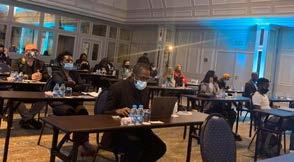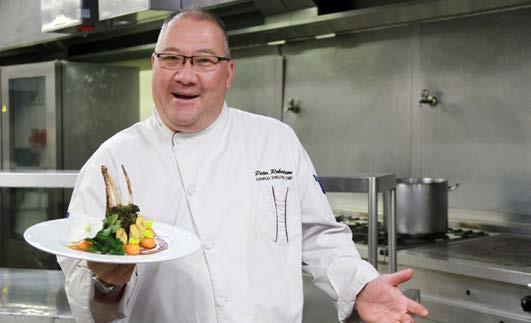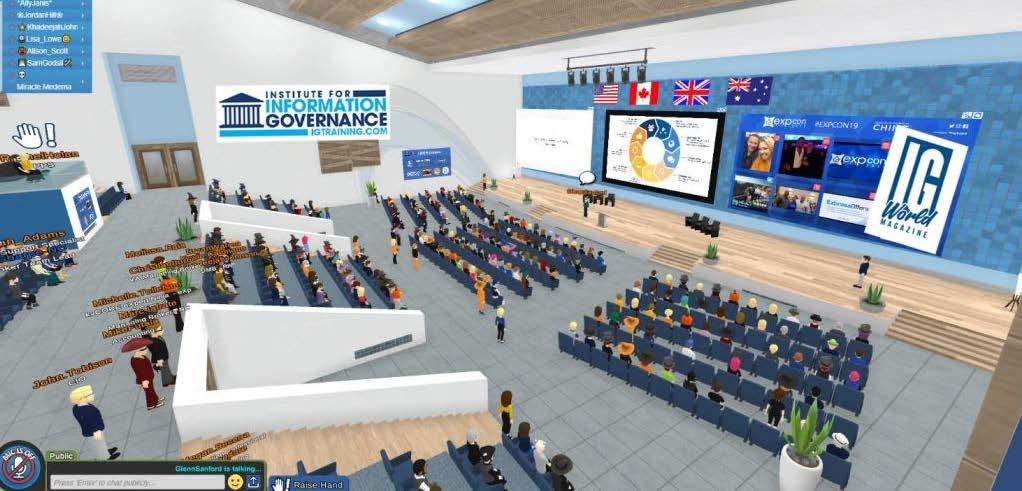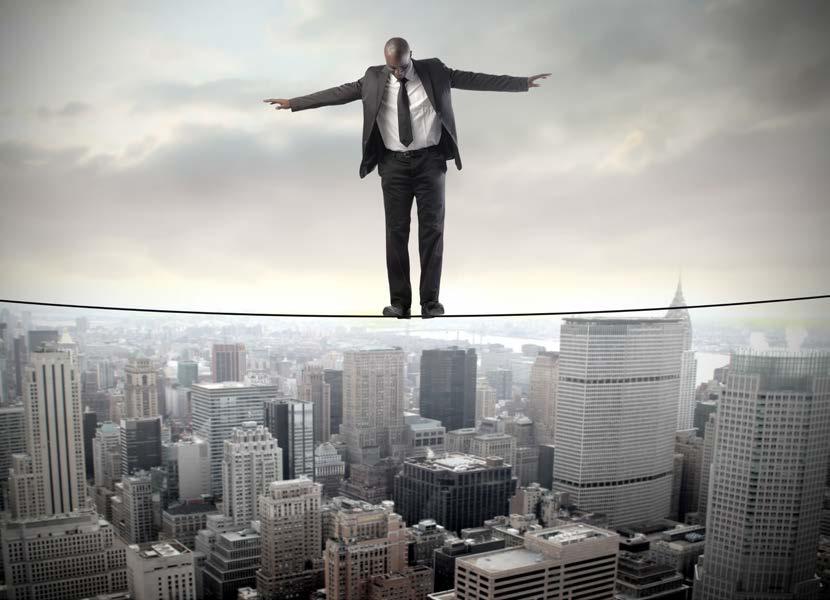
32 minute read
Risky business
Angelique Smith, co-owner and event director at Event Synthesis, talks to Meetings magazine about how the Covid-19 pandemic is spotlighting the need for more careful and thorough risk assessment.

Advertisement
The reality of doing business is that there is and always will be risk – from financial, legal and occupational to natural disasters, data or security breaches, or system failures. Every business owner has the capacity to identify possible risks and determine the appropriate ways of averting and mitigating these. This is not only in their teams’ best interests, but it is a legal requirement to train staff on all potential hazards and to find ways of eliminating, controlling or avoiding them in order to keep everyone, including clients, safe.
The issue is that this wasn’t policed before the Covid-19 pandemic and, therefore, it was not a priority for businesses.
“A number of business owners I have done training for over the past six months have
ABOUT ANGELIQUE SMITH

Angelique Smith is an event management specialist and co-owner of Event Synthesis. She is a qualified and experienced safety officer, and through accredited training facilities Skills College and Appl-Ann, has developed a comprehensive Covid-19 risk assessment training toolkit. This includes relevant material such as a fully editable set of compliant back-to-work documentation, management plan template, employer-employee procedures, risk assessment, letter of appointment for the Covid-19 compliance manager/officer, policy documents and references, mandatory forms, posters, registers, and gazettes. Get in touch with her on angie@eventsynthesis.co.za or +27 (0)60 970 7653.
commented that they did not even know this was supposed to be done,” Angelique says.

STATE OF RISK ASSESSMENT Covid-19 is currently a major health risk. It has caused chaos on a global scale and will continue to affect us for quite some time. As a result, inspectors from the Department of Health have been mandated to check in on companies and monitor whether they are in fact adhering to the law.
“This has highlighted the importance of not just implementing the Covid-19 risk assessment but also existing health and safety risk assessment protocols. This includes the appointment of Covid-19 compliance managers, officers and response teams to ensure that protocols are adhered to for employees and clients, as well as the drafting of a management plan to ensure the smooth implementation of the Covid-19 protocols within each business or premises,” explains Angelique.
With this written into law, those not adhering to the requirements risk being fined, having business shut down permanently, or the possibility of jail time. “Not a risk worth taking!” emphasises Angelique.
DETERMINING RISK She recommends appointing a safety officer or a designated health and safety representative to assist with determining the risks within your company or business. Failing this, business owners should attend a Covid-19 risk assessment course to provide them with the skills needed to identify the various risks and hazards. “Once this is done, as a business, you will be able to identify the risks within your environment for yourself. You will also be able to appoint a compliance officer with confidence, knowing that you understand exactly what to look for and how to manage or eliminate the hazard, which will then enable you to train your staff on how to mitigate and eliminate the risks, making it a safe environment for them and your clients,” notes Angelique.
MANAGING LIABILITY In the event of an incident, the first question asked will be:

“Was everything in your power done to ensure the complete safety of your staff and clients?” Upon investigation, if it is found that there was negligence on the part of the business/business owner, there are serious consequences.
“A risk assessment is an inexpensive option to ensure that everyone knows how to manage various risks, including Covid-19. Staff training is equally important so that everyone
WORKPLACE PLAN & RISK ASSESSMENT
The regulations provide a framework for all businesses that are permitted to operate. Business owners must develop a plan for the phased return of employees to the office or work premises prior to reopening the workplace, which must be available for inspection. The plan must detail which employees are permitted to return to work, what the plans are for a phased return of employees to the workplace, what the health protocols are, and the details of the Covid-19 compliance officer. The size of the business will determine the level of detail required and, therefore, smaller businesses can have a basic plan reflective of the size of the business, whereas large- and medium-sized businesses would require a more detailed plan to cater for a large number of people within the workplace. The plan must correspond with the requirements in Annexure E of the regulations for medium and large businesses. The directive, meanwhile, means that every employer is required to undertake a risk assessment to give effect to the minimum measures required in the directive, with reference to the specific circumstances in a particular workplace. If an employer employs a team larger than 500 people, the employer must submit a record of its risk assessment together with a written policy regarding the protection of employees from Covid-19 to its health and safety committee and the Department of Labour. On top of this, the following laws that have been drafted in the interests of South African employees must also be taken into account: • Occupational Health and Safety Act (No. 85 of 1993; OSHA) • Mine Health and Safety Act (No. 29 of 1996; MHSA) • Compensation for Occupational Injuries and Diseases Act (No. 130 of 1993; COIDA) • Occupational Diseases in Mines and Works Act (No. 78 of 1973; ODMWA) • Basic Conditions of Employment Act (No. 75 of 1997; BCEA) • Labour Relations Act (No. 66 of 1995; LRA).
understands how to mitigate a variety of hazards. Appointing numerous compliance officers then also ensures that there is accountability for negligence,” says Angelique.
Below are a few of the measures to be implemented in the workplace to mitigate risks and hazards. • Date of opening of the business and trading hours. • Timetable reflecting the phased return to work of employees, to enable appropriate measures to be taken to avoid and reduce the spread of the virus in the workplace. • Steps and measures taken to get the workplace Covid-19 ready. • A list of employees who can work from home, including employees who are 60 years or older and/or those with comorbidities who will be required to stay at or work from home. • Arrangements for employees in the workplace such as: - sanitary and social distancing measures and facilities at the entrance and exit to the workplace
- screening facilities and systems - attendance record system and infrastructure - the work area of employees - any designated area where the public is served - canteen and bathroom facilities - testing facilities (for workplaces with more than 500 employees) - staff rotational arrangements (where less than 100% of employees are permitted to work) - arrangements for customers or members of the public, including sanitation and social distancing measures. “It is key that the events industry adheres to the laws as set out by government. This will demonstrate that our industry as a whole is compliant and can manage the risks associated with Covid-19, which will in turn show that we can safely open our doors and get our industry up and running,” highlights Angelique.
APPLICABLE REGULATIONS The regulations issued in terms of Section 27(2) of the Disaster Management Act (No. 57 of 2002) and the directives under the Covid-19 Direction on Health and Safety in the Workplace issued by the Department of Labour (DoL) set out specific measures that employers are required to take to protect their employees in the workplace from Covid-19. There have also been some sector-specific guidelines issued.
“We anticipate that more industries will issue specific guidelines going forward. Every employer that is permitted to operate will need to adhere to the sector-specific guidelines that apply to their business, in addition to the measures set out in the directives of the pertaining regulations,” says Angelique, adding that employers with fewer than 10 members of staff are not required to comply with all the measures and only need to comply with a list of measures applicable to them set out in the Act’s regulations, as well as Clause 40 of the DoL’s Covid-19 directives.
Regulations and protocols are in accordance with Level 1 of the national lockdown and are correct at the time of going to print. These are subject to change in thefuture.
THE USUAL SUSPECTS
The common risks faced by event organisers, venues and service providers prior to Covid-19: • Food poisoning • Service providers cancelling last minute • Entertainers cancelling last minute • Power supply interruptions • Substandard service providers dropping the ball • Financial • Crowd management • Event safety files • Unpredictable weather

With South Africa recently celebrating Heritage Day, Thami Nkadimeng understands the role heritage plays in what future travellers can look forward to.
EVERYONE’S BUSINESS
There are a few buzzwords and catch phrases I have heard throughout the novel coronavirus pandemic, such as “new normal”, “Zoom-bombing” and “Those who quarantine together, quaranteam together”. The phrase that has stood out to me most during lockdown is, “Tourism is everyone’s business”. This rings true because when you decide to invest in tourism, either for leisure or business objectives, the contribution does not only stop at travelling and sight-seeing.
When one travels, the exchange in money helps to contribute towards socioeconomic growth and development by reducing poverty, and this makes us a valuable

An experienced writer, speaker, moderator and MC, Thami Nkadimeng is a message architect who conceptualises, creates and delivers messages to a wide range of audiences, across borders and boundaries, using a variety of tools and platforms to reach objectives set. For opportunities with Thami, contact her on thami@thaminkadimeng.com.
stakeholder as opposed to merely being a participant or a globetrotter.
YOU ARE THE BUSINESS “Tourism contributes towards complete growth and development of a country: one, by bringing numerous economic value and benefits; and, second, helping in build country’s brand value, image and identity (sic). Tourism industry goes beyond attractive destinations, to [be] an important economic growth contributor.” For me, the above definition of tourism on market-width.com sums up why this warrants our attention.
After roughly half a year of being restricted to travel, the gates of the ‘cage’ are now open and the temptation to explore as much as possible is great. And rightly so!
But how are people attracted to a destination before they end up deciding to travel and spend money there?
BE DISCERNING Certain features contribute to the attractiveness of a destination, namely: culture, architecture, gastronomy, infrastructure, landscape, historical and geographical landmarks, events, shopping, and many more.
Level 1 of the national lockdown is upon us, so what now?
I encourage everyone to explore your country first. Use this time to stimulate travel within South Africa by being the ambassador the country needs and play your part in showcasing the love and passion you have for your nation.
Are you contributing towards making South Africa a destination of choice? Still not sure how? Here are a few tips: Videos – We love taking videos but the next time you capture a video, capture one with the beauty of your surroundings and environment. Just recently, I watched a documentary about social media being a dilemma. Truth is the most effective way to market lately – through Instagram, Facebook and Twitter – so use it wisely and do so with your country in mind. Changes – Believe it or not, people are drawn to change. Yes, so much has changed and, yet, so much has stayed the same. What you cannot take away from us as South Africans is our heritage. This makes us who we are, so don’t be shy to share the changes that have contributed towards our rich history, including Covid-19. Influence – If ever your dream was to be an influencer, this is your time. It doesn’t matter how many followers you have in your network; make it a habit to share and promote destinations and offerings in your space. Avoid – As fulfilling as it might be to vent in your public and global spaces through the net, be aware how your words paint a picture of your country. In this instance, pick your battles: you are either promoting the country to grow the economy, or choosing dissatisfaction. Collaboration – The quote by Ken Blanchard that “none of us is as smart as all of us” is so apt for where we are currently. Moving forward after the pandemic will require innovation and artistry that cannot even be found in textbooks.
Now, more than ever, it is true that: alone, we can achieve but together, we can achieve for all!
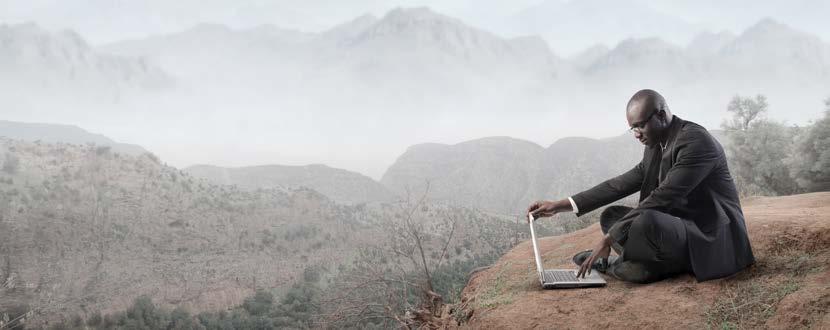
Through collaborative efforts, this year’s Africa MICE Industry Stakeholders Roundtable came together in the most spectacular way. Shanna Jacobsen was part of the action on the day and catches up with organisers Mulemwa Moongwa, Kezy Mukiri and Obinna Nwachuya on how they are working to shape the narrative of Africa’s business events industry.
MICE masters
What do you get when you cross a dynamic and driven group of Africans with a hunger for bridging the needs of the continent’s meetings, incentives, conferences and exhibitions markets? Why, a golden opportunity, of course!
Together with the support of Meetings magazine and The Planner Guru, this year’s Africa MICE Industry Stakeholders Roundtable, which took place on 9 September, was hosted digitally and joined by attendees from more than 20 countries.
The event culminated in engaging discussions with a number of the industry’s key role players, with discussions on the day centred on the

importance of meetings and business events in the socioeconomic development of Africa. This saw participation by experts such as Dr Geoffrey Manyara, economic affairs officer in charge of tourism at the United Nations Economic Commission for Africa, and academics Nellie Swart, certified meetings professional (CMP) and associate professor in tourism at the University of South Africa, as well as Esti Venske, senior lecturer in the Department of Tourism and Event Management at Cape Peninsula University of Technology.
Kevin Hin, secretary general of the Junior Chamber International (JCI), a global organisation with over 150 000 members in 120 countries, moderated what was one of the most relevant sessions of the day. This focused on leveraging the human factor in the recovery of the Africa’s MICE industry.


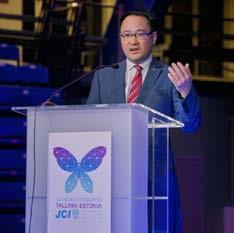
Kevin Hin, secretary general, JCI
“The Covid-19 pandemic’s power lies in its invisibility. We are all united by the crippling effects of an enemy we cannot see and being part of an industry that was the first to close and will likely be the last to return... we need to start focusing on the ‘new normal’,” noted Kevin in his introduction.
JCI has created an initiative called JCI Rise to encourage the participation of the youth in their communities. This is centred on three pillars, namely; preserving mental health, sustaining and rebuilding economies, and motivating the workforce.
In addition, the African Perspectives Report on the MICE Industry was announced to bridge the vast chasm in data within the continent’s MICE sector. The report is a partnership between Niche Partners and The Planner Guru, which will be released during the first quarter of 2021.
One of the most exciting takeaways from the event was the launch of the inaugural Africa Meetings Industry Day and in line with this, it will run as the Africa MICE Summit from 2021, together with the Africa MICE Awards.
HOW IT ALL STARTED We concluded the day’s proceedings with organisers Kezy Mukiri, Mulemwa Moongwa and Obinna Nwachuya highlighting the significance of their collaboration in how the Africa MICE Industry Stakeholders Roundtable came together. After the event, they shared their personal journeys with Meetings magazine.
DEMONSTRATING THE ART OF COLLABORATION Obinna Nwachuya, principal at Sluxia, was born in Nigeria and currently toggles between Prague, Czech Republic, and Abuja, Nigeria. His career began long before he knew it as MICE, he says. Starting out as a marketing executive in charge of beverage supplies for a long list of events across southern Nigeria, his role also involved coordinating partnerships and marketing activations for new brands entering the market.
“From there, I found myself working backstage for Carnival Calabar, different campus activations for Telcos, fashion shows and film festivals. As a young adult, I was fascinated by the orchestra of event creativity and the general idea of taking a concept from mind to paper to a full-blown experience. I was hooked,” recalls Obinna.
He delved into the economics of business events after a rather interesting group project he was assigned to work on just a few weeks after arriving Spain in pursuit of a master’s degree in innovation and tourism marketing. The days that followed brewed a long list of questions and carved a new path: “Why were the majority of conferences that discussed Africa’s future
MICE plays a significant role in reshaping minds, communities and industries – its roots are as deep as our existence as humans and it should never be mistaken for a trend. Let’s get out of our silos and champion Africa to Africa for Africa, with cross-destination collaborations and capacity

championed by non-Africans outside its borders? What is the true cost of Africa’s absence from the nearly trillion-dollar industry and what would it take to grow its slice of the pie?” For Obinna, the mission continues.
For Kezy Mukiri, her journey in MICE started out quite differently.
“I am a lawyer by qualification. In 2007, three years into my legal practice and just after completing my master’s degree, I founded Zuri Events. My vision then was twofold: first, to provide corporate organisations with end-to-end professional brand management solutions using live events to create impactful experiences, and,

second, to create a platform for employment generation aimed at empowering women and young people in my community,” says Kezy.
Zuri Events has since grown from a small Kenyan outfit providing tailor-made solutions to corporate organisations across East Africa to a company focused on research, green innovations and eco-friendly solutions for sustainable event management. This includes training and capacity development for MICE professionals, as well as policy engagement for MICE development across Africa.
Like Kezy, Mulemwa Moongwa was set to start her career in law but after spending her


gap year between high school and university at “Going from an almost-lawyer to a career as a the International Criminal Tribunal for Rwanda, partygoer seemed like a retrogressive move Mulemwa started doubting whether she would be and it always made me feel inadequate. I sought able to establish her career in the field. validation for my life choices and eventually
“I realised then that I was going to struggle with obtained a qualification in conferences, exhibitions a profession where people who are accused of and events management. It still felt like I was hurting even children are not optimising my intellectual capacity working presumed innocent,” in the events industry, so I ventured out and she explains. obtained a certification in organisational learning After taking the and development,” asserts Mulemwa. In 2008, decision to pursue a Mulemwa set up Infinite Learning Consultants, different profession, a training and development business that has Mulemwa worked today evolved into a meetings management firm part-time for a specialising in government-to-government and party planning government-to-business activities. business. DRIVING FORCE Despite the way in which large-scale gatherings have evolved in the wake of the Covid-19 pandemic lockdowns, the potential that MICE experiences hold for the development of business and trade cannot be ignored. “Globally, the Covid-19 pandemic has spotlighted the critical contribution of the MICE industry to many economies around the world. While the impact of the industry on economies, people and communities is not in doubt, the pandemic has demonstrated the need for integration of the industry into the national recovery plans and blueprints, says Kezy. For corporates, MICE is a powerful tool to leverage brand In Africa, we haven’t got development, market penetration, the data that fully quantifies or qualifies the continent’s value and customer engagement in an impactful and meaningful way. Meetings and conferences in proposition, yet we are seeking to Africa can also stimulate activity leverage an industry that in most within associations and generate destinations lacks career or learning paths.” Mulemwa Moongwa, managing much-needed revenue, with trade shows and exhibitions being a means to increase research and consultant, Infinite Consultants development, as well as create



continued cultural exchanges that would ensure the sustainability of development agendas such as Vision 2063.
“The MICE industry is a critical platform for social education and enforcing behaviour on core issues such as sustainability. We are engaging with virtually all sectors of our economy, and this presents MICE professionals with a unique opportunity to impact communities and inspire the adoption of sustainability consciousness in organisations and associations for whom we organise meetings and events,” highlights Kezy.
Obinna agrees that, beyond being a clear source of employment and contributor to local economies, MICE also plays the role of an appetiser to leisure tourism; however, Mulemwa cautions that significant strides need to be taken to prioritise the industry and unlock the economic power and potential of MICE and business tourism.
“We are an industry that has the most unifying effect on the continent, which can lead to the harmonisation of so many efforts. In our objectives to host the Africa MICE Summit, we envision a continent that will collaborate and compete more in this space,” she says.
WHERE WE CAN BE With a population of over 1.2 billion, the MICE industry depends on the movement and coming together of people and, Mulemwa points out, targeting just 10% of this population would be significant for the growth of the associations movement and business tourism with an intraAfrican approach.
“Regions that have prioritised MICE as an important driver of tourism have seen an earlier turnaround in response to the Covid-19 pandemic but until we recognise the value of developing our knowledge base, we will never change our current narrative,” says Mulemwa.
The 21st century has placed a premium on human contribution to development; people, their collective experiences, knowledge and potential provide the asset with the highest value for any
organisation or destination. Mulemwa feels that if we want to advance the current narrative, we need to shift our focus to developing our human capital first
“In the absence of defined learning or career paths, we will struggle to optimise the potential of the MICE industry on our economies,” she says.
With the evident challenges that need to be addressed, Kezy drills down the issue further, noting how Africa has lagged behind in leveraging MICE to maximise tourism earnings.
“I aspire to see a thriving MICE sector in Kenya and across Africa but more investment needs to be made towards supporting research and innovation for the development of the MICE industry in Africa. This is an opportunity that associations and academia should run with, as the absence of data to inform well-thought-out MICE strategies and policies in many African countries hampers the ability of the continent as an attractive investment destination. Whereas many African destinations have made significant investments in leisure tourism, a lot needs to be done to prime destinations for MICE and business tourism,” comments Kezy.
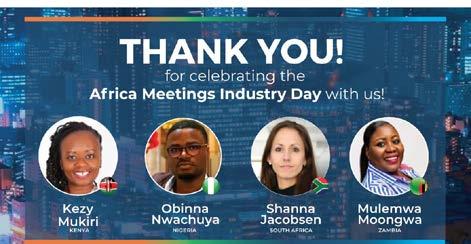
REALISING THE COLLECTIVE DREAM With the exception of South Africa, the MICE industry in Africa is still at a nascent stage and holds huge untapped opportunities. Despite being blessed with unique propositions to spearhead business and socioeconomic opportunities, most African destinations still struggle to make clear cases for MICE investments.
“MICE commitments are long term and where infrastructure investments form part of this scope, it is only in a few rare cases where policies might have been established; for the most part, however, the challenges of continuity, accountability and security due to political and social instabilities strangle investment efforts,” says Obinna, adding that the continent’s late entry could work in its favour.
“Coming in late gives us readily available insights and templates we can leverage while designing solutions that are as unique as we are,” he says.
Another advantage is that Africa is strengthening its offering as a competitive MICE destination as the metrics we are using are based on areas of need that are currently relevant, thus ensuring the right economic cases needed for policy integration are made. The organisers of the Africa Meetings Industry Roundtable are committed to ensuring that this comes to fruition.
“Now that we have our own Africa Meetings Industry Day, I will advocate for the
As a professional who has a keen interest in trade development in Africa, the MICE industry appeals to me due to its capacity to create and enhance trade and business connections, as well as its potential for knowledge and skills transfer and community impact.”

Kezy Mukiri, founder, Zuri Events
continent to continually engage and collaborate to rotate events all year round. I will only be satisfied when we are an industry that is able to attract and grow the best talent and will continue to advocate for the professionalism of the industry across Africa using the power of intracontinental dialogue,” Mulemwa pledges.
Obinna shares this vision and believes that Africa can significantly increase its business tourism quota by developing initiatives that encourage the research needed to enable convention bureaus to act as brokers of innovation. This, he says, will create a better economic case for MICE and must incorporate

cross-destination collaborations as part of core strategies; however, we need to re-evaluate event values and practices as well as extend to investing in relevant knowledge and the global accreditations required to compete internationally.
In a similar vein, Kezy highlights that even though individual countries on the continent will naturally compete for business, there is a pressing need for industry collaboration between the various stakeholders to drive the growth of the industry and enhance Africa’s positioning as a MICE destination.
“We need to see more intentional and guided inclusion of the MICE industry in the fiscal and development agenda at policy level in more African countries. This will perhaps only be realised as a result of more structured engagement between private sector players, academia and government agencies in the tourism sector,” she says.
Her company, Zuri Events, recently launched a hub to support research and innovation for sustainable business event management in East Africa. The MICEhub is also an incubator for techdriven MICE enterprises.
“We are keen to play our part towards supporting the growth of the MICE industry in Africa,” she concludes.

THE WORLD STOPS FOR NO ONE
Lisa Jade Hutchings, founder and head ginger of GingerBiscuit, on how the Covid-19 pandemic has spotlighted the pressing need for more sustainably led efforts.
One would like to believe that we knew it was coming… we just didn’t know when, how or within what timeframe. The warnings were all there, and when the now well-known novel coronavirus landed on South African shores in March 2020, it was a stark realisation when the gravity of the situation hit us on a collective scale. However, there were differences. We may have all been in the same storm, but we weren’t in the same boat.
The global Covid-19 pandemic has amplified the cracks within the system, as well as society at large. Widespread poverty dug itself deeper into the very fabric of our nation and the glaring gross inequalities that have existed for so long alongside the various other large-scale issues we face, both within our borders and globally, highlighted the climate crisis and breakdown in biodiversity. This has opened our eyes with absolute clarity and resulted in profound shockwaves rippling through every family unit, household, industry and business. The fallout within the events and hospitality industry has been particularly devastating. Companies, individuals and groups across the sector saw their dreams and livelihoods shattered overnight, right before their very eyes, with many of us holding on by just a thread and, unfortunately, some not at all.
It is a grim picture, if we look at the reality of the situation. Yet, somehow, perhaps Covid-19 has given us unique insight into the areas of society that so desperately need our correction and urgent attention, as well as being able to adequately build our resilience not only as people, but as an industry in the face of our current operating context.
We can no longer look away.
WHAT DOES ‘CLIMATE CRISIS’ MEAN? The term climate crisis is used to show a greater sense of urgency around climate change. The climate isn’t just changing – it’s reached a state of emergency, or crisis. If humans don’t do something about it now, the consequences may be catastrophic.
To unpack this further, ‘climate’ in its simplistic term refers to earth’s entire system. It is a complex system influenced by many factors. This includes the atmosphere, land, oceans, snow, ice and ecosystems. It should also be noted that global conditions have an impact on weather patterns and climate varies from region to region. Perhaps one of the most fundamental points to note is the interconnectedness of the climate; if one component changes, this influences the whole system. Climate change is a naturally occurring process due to the small variations in the planet’s orbit, but since the beginning of the Industrial Revolution, growing evidence suggests that the current cycle or trend is due to human impact, primarily due to the increase in the release of greenhouse gases into the atmosphere, as well as our use of land, etc.
Lisa Jade Hutchings, founder and head ginger of GingerBiscuit

– Unknown
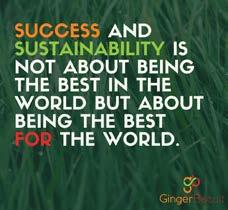
“Everything we do today is geared toward ensuring a safer and more productive tomorrow. Our sustainability is founded on creative, mutually constructive relationships and common values
with our stakeholders.” Exxaro

Some of the human activities that contribute to climate change include electricity and/ or energy generation, transportation, and land uses such as agriculture, forestry (deforestation) and others such as waste.
So what does this have to do with the events industry? It’s really quite simple.
The business events space is one of the only industries whose primary focus is that of other brands. In short, when other businesses are affected, we feel it, as our client base dries up. In addition to that, events can impact on not only the environment but also the communities that host them in a relatively short space of time.
Think about the amount of waste, for example, that a single large event can produce. In short, our very survival as a species depends on the planet – and through that, our livelihoods and that which we so dearly love.
The climate crisis is also fundamentally linked to the social aspect of society. Studies have shown that while we will all be affected by the effects of climate change, marginalised and oppressed groups, such as people of colour and women, are most likely to be hit the hardest to begin with – there is no escaping this.
If Covid-19 has given us anything, it is an opportunity to rethink the system, how we function as an industry therein, as well as the impact we stand to make. It has also taught us that we can deploy mass mobilisation and adapt accordingly in the face of a global crisis.
ENTER SUSTAINABILITY Sustainability may be loosely defined as the ability to meet today’s needs, without compromising the needs of the future. Three pillars of sustainability exist – environmental, social and economic. In order for something to be truly sustainable in nature, these pillars need to be considered, incorporated and implemented along every step of the journey.
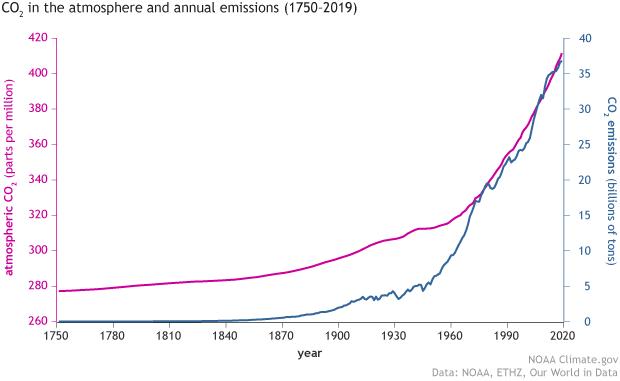

So, what does sustainability in action look like within the events space?
Storytelling is an incredible medium to connect with people. Events are one such resource utilised in the GingerBiscuit toolkit when engaging in creative actions that aim to inspire, tell a story and prompt real action and awareness. Through our fusion of being both specialised sustainability and event professionals, we work with organisations and individuals alike in order to bring this vision to fruition, not only within our company but also through partnerships and collaborations.
One such event to demonstrate sustainability in action within the events space was the Exxaro 2020 Sustainability Summit.
For the 2020 Sustainability Summit, Exxaro took its commitment to sustainability further by choosing to implement various event greening practices into the summit, thus further demonstrating its dedication by walking the talk through tangible action.
GingerBiscuit was subcontracted to design, strategise, implement, manage and monitor the overall sustainability for the summit by Event Wizards – the event management company selected by the client for this particular event – under project lead Herkie Du Preez. In addition, we also had the opportunity to work alongside all event suppliers, Greg McManus from The Heritage Environmental Management Company, who undertook the role as the event’s sustainability auditor, as well as Joe Public, which conceptualised the theme – The Future Now – and elements to bring Exxaro’s philosophy on sustainability to life. Fusing sustainability into an event from a level of managing
the social, environmental and economic impacts/benefits of the gathering is a fully collaborative effort – it takes the buy-in of the whole team, as well as the client, to implement the decided-upon actions and management efforts, which are in themselves very much dependent on what the event greening goals are.
While GingerBiscuit set the tone for the overall sustainability of the event objectives, every single supplier, service provider and contributor came together to create something spectacular.
What also made this event so special was that the client’s commitment to the overall greening process, as well as sustainability, was nothing short of remarkable! Across Exxaro’s sustainability pillars, the organisation is driven by the belief that what we do now is critical – our today is our tomorrow, our present is our future.
The overall audit results for the sustainability of the Exxaro 2020 Sustainability Summit met a 98.7% level of compliance – an almost perfect score.
The unique package GingerBiscuit formulated for this event was as follows, in no particular order:

• overall event sustainability strategy • PR and communications support/guidance in line with the overall event sustainability vision/goal • marketing support/guidance relating to the areas pertaining to sustainability of the event • in-depth consulting surrounding the various event greening initiatives • sustainable event planning and coordination (both on- and off-site – pre, during and post event, as well as for the legacy project leading up to the event) • vision statement development and implementation • a unique and customised event handbook specifically focused on sustainability, which is part of the GingerBiscuit event strategy • legacy project development and implementation in partnership with the
Hennops Revival NPO, translating into a river clean-up of the surrounding areas • visual and written feedback reporting • administration relating to sustainability • supplier support and guidance to meet the overall target of the event • data collection for the appointed and independent event auditors, in relation to
administration/planning, finite resource use, logistics, marketing, etc. The remarkable story and example of the Exxaro 2020 Sustainability Summit demonstrates that sustainability can indeed be achieved and that a difference can be made through collaboration, team effort and the client’s commitment, while seeing the bigger picture.
Now, more than ever, this is needed.
IN THE END The Covid-19 pandemic has not only exposed society’s weak spots, but also our own as an industry.
It is time we get vulnerable and real with ourselves and, through this, open our industry and us as professionals up to the many new postpandemic possibilities that exist, starting with having the difficult conversations.
We have been given a massive opportunity to reshape, innovate and tell a different story with action; change is only seen as a threat to those who are unable to see the opportunities that lie therein.
We have a responsibility not only to ourselves, but more profoundly to our clients, society and the impact our space has on the world – be clear about our purpose.
While much focus has been given to environmental sustainability in the past, and this must continue, alongside our improvement thereof, in moving forward, particular emphasis should be placed on the other pillars of sustainability too – both social and economic. In addition, we cannot be putting solutions in place that do not take into consideration the fundamentals of human rights, such as diversity, inclusion and doing away with systems that uphold oppression, as these are directly interlinked with the climate crisis.
What impact will this action have on the environment and communities that host our events? Whose voice is missing and excluded from the table? Where can we do better? These are just some of the questions we will have to ask and continue to ask moving forward.
Make no mistake – it is a system we operate in; to do it differently, we have to actually be different.
After Covid-19, we will have to make some subtle and some bolder and ambitious changes within the events space. And in relation to sustainability in particular, we will no doubt be able to draw on past experiences while moving forward and adapting accordingly.
Sustainability is a journey, not a destination – it is constantly changing and evolving with the times.
The world waits for no one; do not allow yourself to be left behind.





